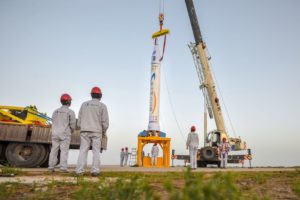
Chinese private launch company OneSpace successfully carried out the maiden launch of its rocket, marking the first entry of a private launch company from China into the increasingly crowded global small satellite launch market.
The launch took place amidst revelations that OneSpace might be the recipient of Chinese government subsidies and other kinds of aid, and is looking to position itself as part of the massive and ambitious Chinese Belt and Road Initiative (BRI), the infrastructure initiative on land, sea, air, space, and cyberspace that encompasses the Eurasian supercontinent and the Indian Ocean Region (IOR).
OneSpace Technologies, based in Beijing, launched its OS-X rocket from an undisclosed location on a suborbital trajectory on Wednesday, 16 May 2018, reportedly reaching an altitude of 40 kilometers and traveling about 274 kilometers before falling back to Earth. It’s the first demonstration of what the company says will become a scalable business built around sending small satellites into space.
Until now, China’s space industry has been dominated by its government space agency, the China National Space Administration (CNSA), which has sent humans, satellites, and science missions into space. Its projects have included putting robots on the Moon and placing two space stations into orbit.
China has been involved in a national space programme for nearly 50 years, but President Xi Jinping made private space enterprise a particular priority for China in 2012, when he said he wanted China to become a “spaceflight superpower.” Beginning in 2014, the government officially permitted private companies to start working toward launching satellites.
OneSpace is the first private Chinese company to launch a rocket, and it has plans to continue its growth. OneSpace CEO Shu Chang told the state-run news outlet China Daily that he hopes OneSpace becomes “one of the biggest small-satellite launchers in the world,” and that it plans to perform 10 launches in 2019.
Shu also compared OneSpace to SpaceX in an interview with CNN Money, describing that “this is the first rocket developed and built entirely with homegrown technology.” However, OneSpace was reportedly founded with money from the Chinese State Administration for Science, Technology and Industry for National Defense.
Further, it was reported on The Verge, this particular flight was paid for by China’s state-owned Aviation Industry Corporation. The Verge also reports that “the rocket’s other name (the ‘Chongqing Liangjiang Star’) a nod to state-run Chongqing Liangjiang Aviation Industry Investment Group — which OneSpace is partnering with to build a research and manufacturing base that will be part of the Chinese government’s massive Belt and Road initiative.”
If true, these revelations suggest that OneSpace could eventually compete for a share of the global small satellite market thanks to state subsidies and other forms of government assistance. The collaboration with the Chongqing Liangjiang Aviation Industry Investment Group to build a research and manufacturing facility as part of the BRI might also mean that OneSpace could be competing for the small satellite launch market in countries that are participating in the Belt and Road Initiative, perhaps offering rates that undercut competitors.





